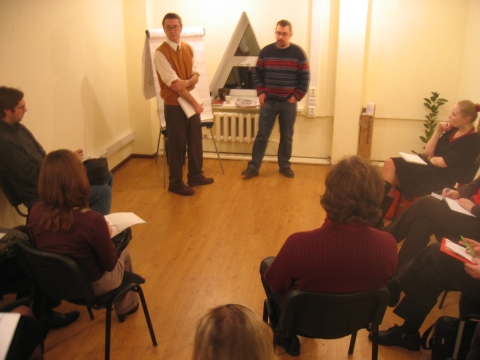
Eric Schwartz (left) and Alexei Terehov of Moi Rayon talk with young journalism students.
Intensive journalism classes begin in Moscow newsroom.
Eric Schwartz (left) and Alexei Terehov of Moi Rayon talk with young journalism students.
Western commentators understandably worry about growing restrictions on press freedom in Russia, but in the eyes of new journalism students in Moscow I see bright signs of hope. At the Moscow newspaper office of Moy Rayon, we are holding journalism classes for about a dozen young students, who exhibit much of the same fire found in journalism students in the United States. They want to find and tell the stories in their neighborhoods. They want to help their society address serious problems that are manifested on the local level. How is a recent murder being investigated? Why is trash in a particular neighborhood such a problem? What is the story behind a never-ending construction project?
These are some of the stories that the students brought in last night, the third night of a five-day course. At this point, we had already discussed the definition of “news,” how a newspaper like Moy Rayon functions, and where reporters get their story ideas. Last night we first discussed the story ideas the students brought, openly offering criticism and suggestions. I instructed the students to come in with at least three developed proposals for articles, on the expectation that the first two might be rejected. In fact, some students did have their first two ideas rejected, but most of them had their first suggestions accepted.
The homework assignment last night was to begin reporting on the article ideas that were accepted. On Sunday, there will come in for a long class session – from 11 a.m. until about 4 p.m. We’ll go over some of the basics of newspaper writing – writing the lede, the inverted paragraph, the soft lede. After a couple of in-class exercises, they will begin writing their newspaper articles. I’ll observe their progress after a couple of hours. The last class will be held on the following evening, when their finished articles will be presented to the editor of the paper. If an article is promising, it may be published, and the writer may be hired.
The management has been supportive of this project, offering me the resources I need to work – basically a desk, a computer, and a telephone. They also have participated in the class. On the first day, Dima Surnin, editor-in-chief, introduced Moy Rayon. On the second day, Alexei Terehov, one of the newspaper’s editors, described for the students where he has found some of his best story ideas and how these ideas were developed.
My project is centered in but not confined to Moscow. Next week, I will be meeting with newspaper editors from a chain of business weeklies in the Ural Mountains. Following this meeting, I will be presenting a workshop on investigative journalism and editorial writing to a small group of journalists from other independent newspapers in the region.
So while Western commentators decry restrictions on Russian media, this doesn’t mean that journalistic independence is dead. It’s just that that largest media organizations have largely come under the control of the Russian government or its allies. Journalistic independence still lives in the smaller voices on the margin, and hope still lives in the eyes of young journalism students.